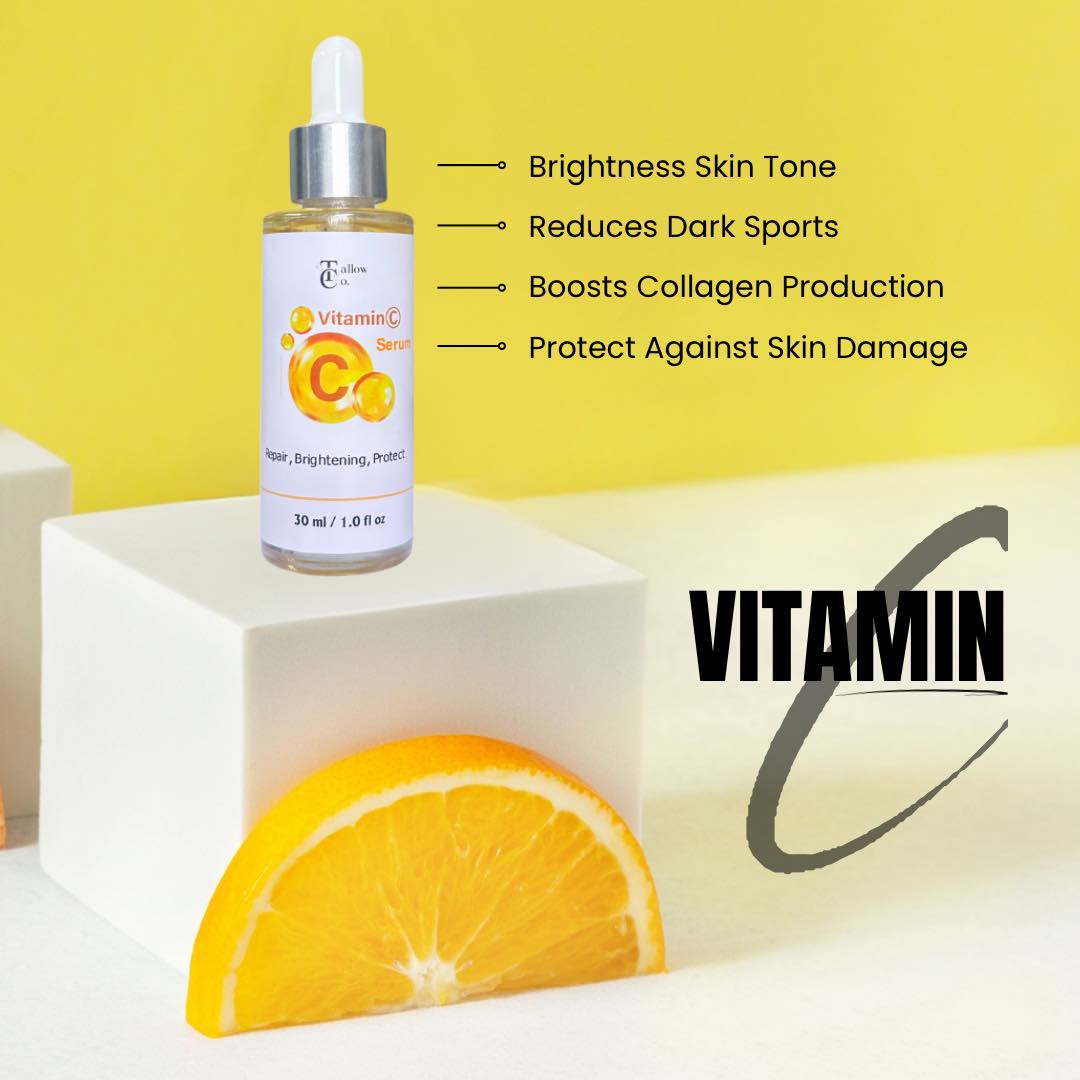
Vitamin C vs. Collagen in Skincare: Which Boosts Collagen Production Better?
Share
If you’ve ever wandered down the skincare aisle or scrolled through a beauty blog, you’ve probably noticed two ingredients stealing the spotlight: Vitamin C and collagen. Both promise to turn back the clock on your skin, keeping it firm, plump, and glowing by supporting collagen—the protein that’s basically the scaffolding of your complexion. But when it comes to skincare, which one actually delivers on collagen production? Let’s break it down, bottle by bottle.
Collagen: The Skin’s Building Block
Collagen is the real MVP of youthful skin. It’s what keeps your face bouncy and smooth, but here’s the bad news: starting in your mid-20s, your body pumps out less of it, and environmental stressors like UV rays and pollution chip away at what’s left. Skincare brands have caught on, slapping “collagen” on everything from creams to masks. But does slathering it on your face really work?
Vitamin C: The Collagen Catalyst
Vitamin C is a skincare darling for a reason—it’s a master at kickstarting collagen production. Unlike collagen, which is a protein, Vitamin C is a vitamin (duh) that your skin can’t produce on its own. In topical form, it’s a game-changer. Here’s why:
• Boosts Collagen Synthesis: Vitamin C is a cofactor for enzymes (prolyl and lysyl hydroxylase) that stabilize collagen molecules. More stability = more collagen in your skin’s dermis layer.
• Fights Damage: As an antioxidant, it neutralizes free radicals from sun exposure that break down existing collagen. Think of it as a shield for your skin’s structure.
• Brightens, Too: Bonus points—it fades dark spots and evens tone, making it a multitasker in your routine.
Skincare Form: You’ll find Vitamin C in serums, moisturizers, and masks, usually as L-ascorbic acid (the gold standard) at 10-20% concentration. It’s most effective when paired with a stable formula (check for ferulic acid or Vitamin E) and stored away from light.
The Catch: Vitamin C doesn’t add collagen—it helps your skin make it. Plus, it can be finicky—too high a concentration or improper pH, and it might irritate sensitive skin.
Collagen: The Topical Temptation
Collagen in skincare sounds like a no-brainer—rub it on, and your skin gets an instant collagen boost, right? Not quite. Collagen molecules are huge, and most can’t penetrate beyond the skin’s surface (the stratum corneum). So, what’s the deal?
• Moisture Magnet: Topical collagen acts as a humectant, drawing water to the skin for a temporary plumping effect. That “instant glow” you see? It’s hydration, not new collagen.
• Signaling Potential: Some studies suggest smaller collagen peptides (hydrolyzed collagen) might signal fibroblasts (collagen-making cells) to produce more. But the jury’s still out on how much gets through.
• Surface Support: It can form a protective layer, locking in moisture and softening fine lines—at least until you wash it off.
Skincare Form: Collagen pops up in creams, sheet masks, and even “collagen-boosting” serums, often paired with peptides or hyaluronic acid for extra hydration.
The Catch: Big collagen molecules don’t sink deep enough to rebuild your skin’s collagen stores. Any production boost is minimal compared to what your body does internally—and that’s where Vitamin C shines.
Head-to-Head: Who Wins for Collagen Production?
So, which one’s the collagen king in skincare? Let’s look at the evidence:
• Vitamin C Takes the Crown: Research backs it hard. A 2017 study in Clinical, Cosmetic and Investigational Dermatology showed topical Vitamin C increased collagen synthesis in human skin, improving firmness over 12 weeks. It works from the inside out, supporting your skin’s natural process.
• Collagen Plays Backup: Topical collagen’s benefits are mostly surface-level. A 2021 review in Journal of Cosmetic Dermatology found it hydrates and smooths, but there’s little proof it significantly boosts collagen production when applied. Oral collagen supplements might help more, but that’s another story.
The Twist: They’re not enemies—they’re better together. Vitamin C builds collagen, while topical collagen hydrates and supports the skin barrier. Pair a Vitamin C serum with a collagen-infused moisturizer, and you’ve got a dynamic duo: one creates, the other pampers.
How to Use Them in Your Routine
Ready to glow? Here’s how to work both into your skincare game plan:
1. Vitamin C Serum (AM): Apply a 10-20% L-ascorbic acid serum after cleansing, before moisturizer. Follow with sunscreen—Vitamin C loves a UV shield to max out its antioxidant perks. Start with 3-4 days a week if you’re new to it (it can tingle!).
2. Collagen Cream or Mask (PM): Use a collagen-rich moisturizer or sheet mask at night for hydration and a soft, plump feel by morning. Look for formulas with peptides or niacinamide for an extra collagen-friendly boost.
3. Layer Smart: Vitamin C goes on first (it’s water-based and potent), then lock it in with a collagen cream (oilier and heavier).
4. Support from Within: Eat Vitamin C-rich foods (citrus, berries) and consider collagen peptides in your diet—skincare’s only half the battle.
Final Thoughts: The Collagen Verdict
For collagen production in skincare, Vitamin C is the real hero. It dives deep, sparking your skin to build more of that precious protein. Topical collagen? It’s more of a supporting act—great for hydration and a quick glow, but it won’t rewrite your skin’s collagen story. The best move? Use Vitamin C as your workhorse and collagen as your finishing touch. Together, they’ll keep your skin looking like it’s defying gravity—and time.
